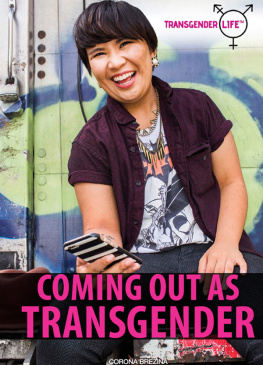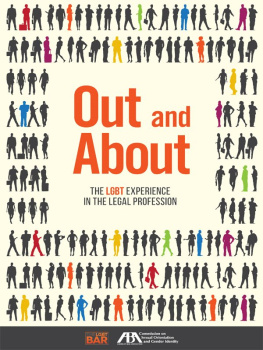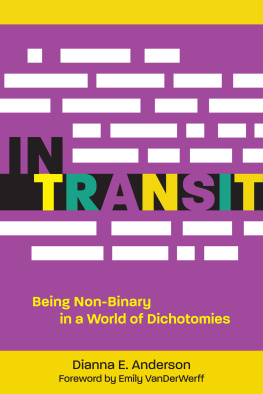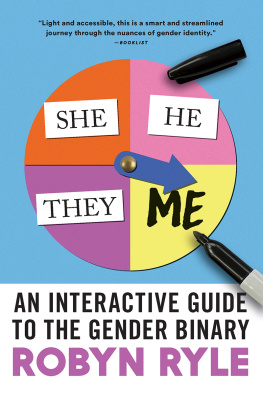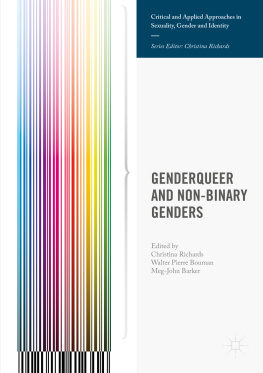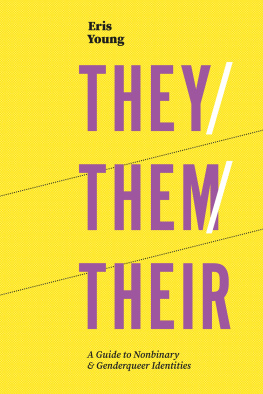Contents
- Cover
- FOREWORD
- INTRODUCTION
- CHAPTER 1
- CHAPTER 2
- CHAPTER 3
- CHAPTER 4
- CHAPTER 5
- CHAPTER 6
- NOTES
- DISCUSSION QUESTIONS
- ORGANIZATIONS TO CONTACT
- FOR MORE INFORMATION
- INDEX
- PICTURE CREDITS
- ABOUT THE AUTHOR
CHAPTER 4
Finding the Right Language
L anguage is an enormous part of identity. Names distinguish one person from another and help form a sense of self. The words used to describe a persons gender identity help them express themselves to others. Pronouns help a person describe other people, and often they signify a persons gender. Pronouns are substitutes for nouns, and are frequently used in reference to people. Pronouns such as I, me, my, you, your, she, her, he, his, they, and their are used in nearly every conversation a person has. In the English language, some pronouns are gendered. Society considers she and her feminine and he and his masculine. These distinctions are part of the social construct of genderthey are made up. However, because society associates gender with these pronouns, when a person refers to other people using these pronouns, they are ascribing a gender to them whether they intend to or not.
The Importance of Pronouns
Many transgender people are not comfortable with the pronouns associated with their assigned sex, and instead identify with a different set of pronouns that they feel better suits their gender identity. These are often described as preferred pronouns. While many transgender people are comfortable with this term, it is better to simply say pronouns. In BuzzFeedYellows Why Pronouns Matter for Trans People video, Ian Harvie explained, Its not even preferred pronoun because it is their pronoun.56 The word preferred makes it sound as though there are other acceptable options, but you are the only person who gets to decide your pronouns.
If a person is not comfortable with the pronouns associated with their assigned sex, finding pronouns that they feel good about can be an identity-affirming process. ReachOut, an online resource for teens, outlined important things for a person to keep in mind as they figure out the pronouns that work for them:
Its okay to switch pronouns as many times as you want. You might try out different pronouns for a while to see which ones fit you best. Be patient with yourself during this process, and dont get discouraged if it takes some time to find ones that fit.
You might also find that there isnt an endpointto your pronoun journey and that what works best for you is switching between pronouns or having people use a mix of pronoun sets.
Gender trumps grammar. Language is evolving all the time. Its okay to use the singular they and newer pronouns. If you feel like none of the pronouns that have been created so far fit you, you can even make up your own!57
Activist Kat Blaque said, If you care about someone, youll respect who they are. And part of respecting trans and nonbinary people is using the right pronoun.58 A person deserves to have their identity respected, and to be described with language they are comfortable with. Using the pronouns that a person is comfortable with shows them that their gender identity is respected, and also that they are respected as a person.
Gender-Neutral Pronouns
Anyone can choose to go by she and her, or he and his, or a combination of both, even if they do not identify as strictly female or male. However, many people are not satisfied with these two options because they each carry stereotypes and ideas that are rooted in the gender binary. Blaque explained, There are some situations we really put way too much stock into whether or not somebody is a man or a woman. Theres a lot of situations that we just dont need to necessarily have gendered language.59 In other cases, people might identify with femininity and masculinity, but these polarized pronouns still do not feel right. Harvie said, For a long time, a lot of people have felt that they dont fit into the mold of primarily he or primarily she, or maybe they feel theyre a blend of both, and that theres not really a word for that.60
Gender-neutral pronouns are developing to fill these gaps in gender language. As of 2016, the most popular gender-neutral choice in English is the singular form of they. This word describes an individual person without ascribing a gender. For example, Robin always plays their bass after school. Theyre a very talented musician. In 2015, the American Dialect Association declared the singular form of they to be the Word of the Year. These words have become an empowering option for transgender, nonbinary, and gender nonconforming people who do not want to identify themselves with feminine or masculine words.
All About Respect
One of the most important steps in respecting someones pronouns is to avoid making assumptions. Blaque said, Were used to looking at someone and assuming what their pronouns are. But assuming pronouns can impact trans and nonbinary people in a very negative way.61 Making assumptions about a persons pronouns is the equivalent to making assumptions about that persons gender identity. Writer Joli St. Patrick wrote:
Grammar Is Changeable
Grammar may seem like a code of unbreakable rules, but it is actually changing and growing with the culture all the time. Some of these happen so subtly that people do not even notice them, and many people who notice do not care as long as the meaning of a word or sentence is clear. For instance, in the past, the word stream was used to define a flow of liquid or gas. After technology advanced to the point where people could use the Internet in their homes, another meaning was added to the word stream: a flow of data.
These changes are important to note because people who use they instead of gendered pronouns may be corrected by people who dislike that they are breaking a grammar rule. In English, they is officially a plural pronoun, but Englishspeaking people have been using the word they as a singular pronoun for centurieseven famous writers such as Jane Austen, Geoffrey Chaucer, and William Shakespeare. Saying that a person cannot refer to themselves with the word they because it is not grammatically correct is not a valid argument.
When you misgender me, you tell me many things. You tell me that you know who I am better than I know myself. You tell me you are not safe or trustworthy. You tell me you have scrutinized my physical appearance, made invasive extrapolations, and sorted me without my consent into a category based on your conclusions.62
Assumptions about a strangers gender identity are based on the stereotypes of femininity and masculinity resulting from the gender binary. When a persons gender identity is assumed, the gender binary and its narrow concepts about femininity and masculinity are being perpetuated. Spoken word artist Kit Yan said:
By not assuming and respecting peoples pronouns, you shift your view of the world to one that sees humans for the complicated folks that they are. You are saying I am asking how you see yourself, because we are not entitled to know or guess peoples identity.63
In short, instead of assuming what a persons pronouns are, they should be asked what their pronouns are.
Normalizing Pronouns as Part of Introductions
Conversations about pronouns can be awkward, especially when people are meeting for the first time. Writer Petey Gibson stated:
If youre not sure the pronoun that someone uses, ask them. Hey, what pronoun do you use? It is a simple and direct way to find out, and then using that pronoun, even if it doesnt slip off the tongue easily at first, will become second nature in no time. And using the pronoun that that person uses can entirely change the impression they have of the place they hold in this world. What a simple gift to give somebody



